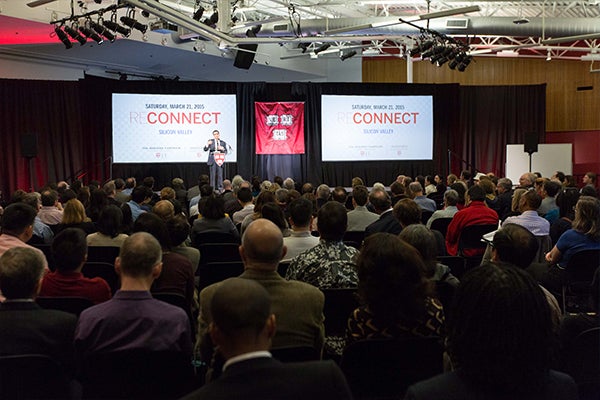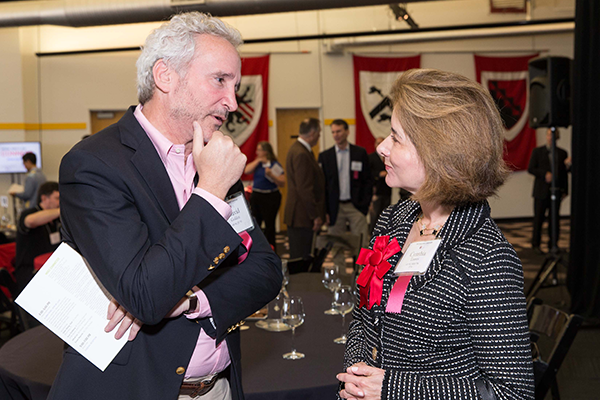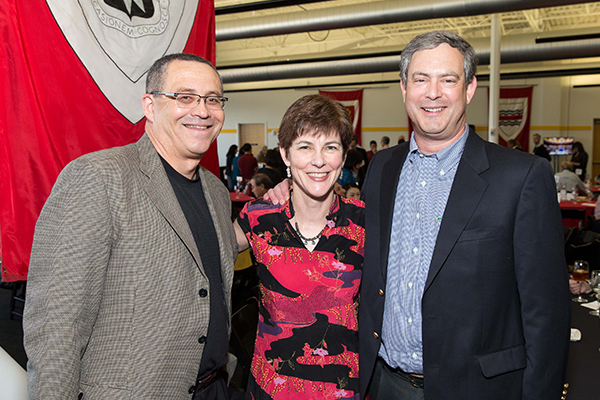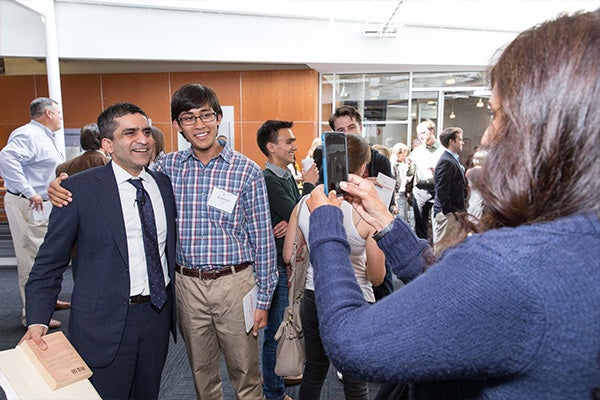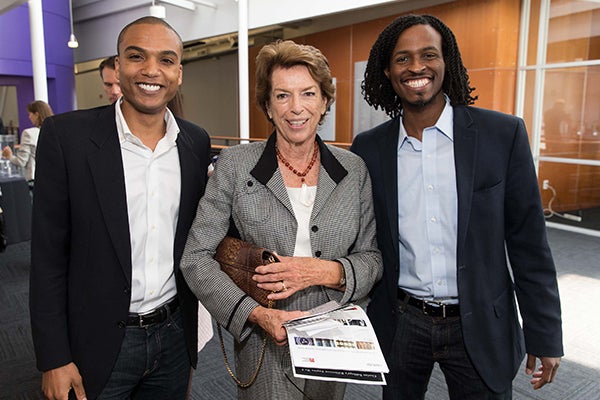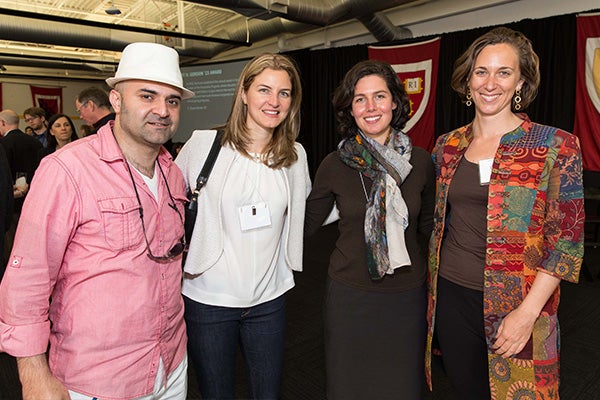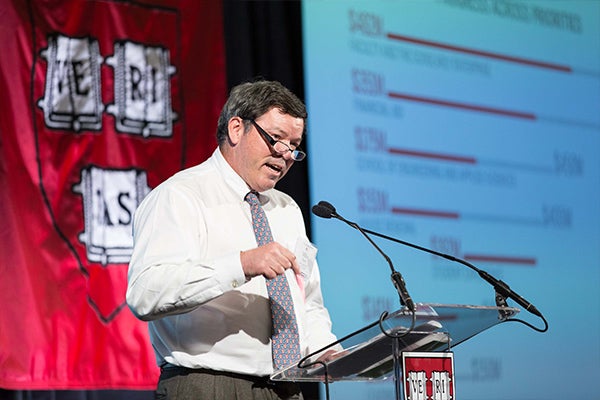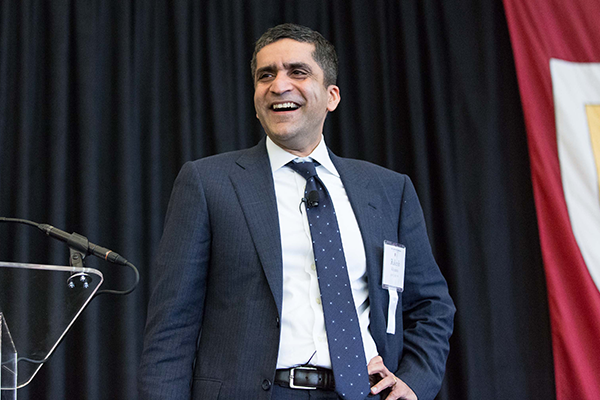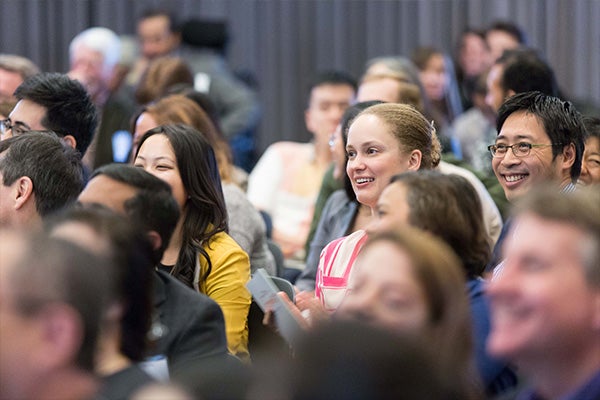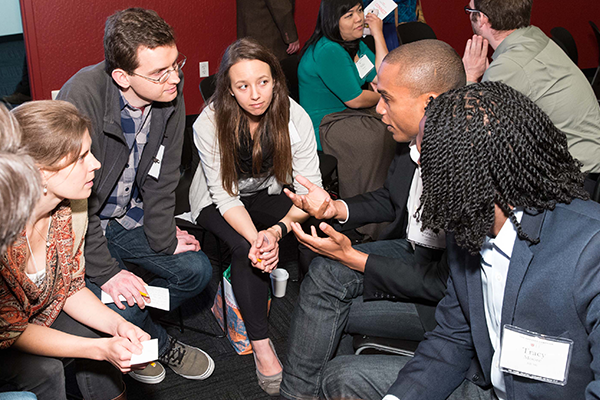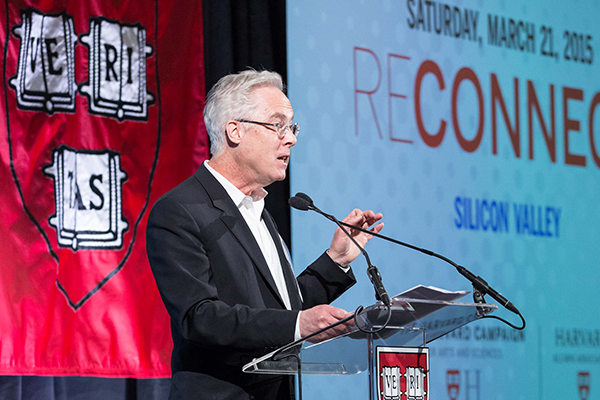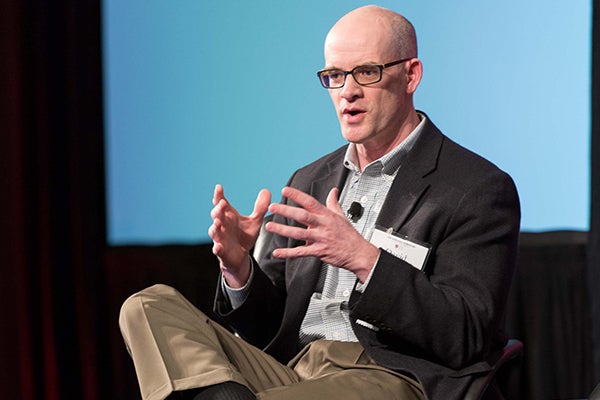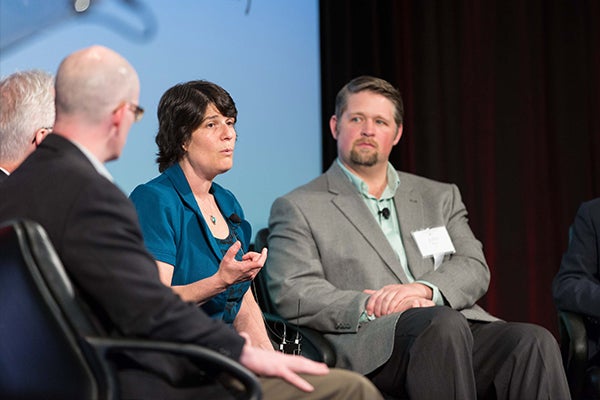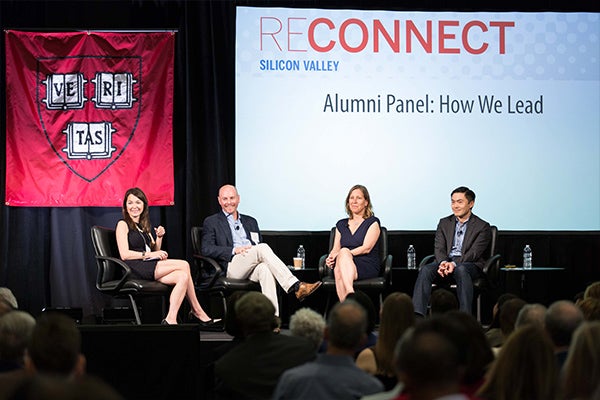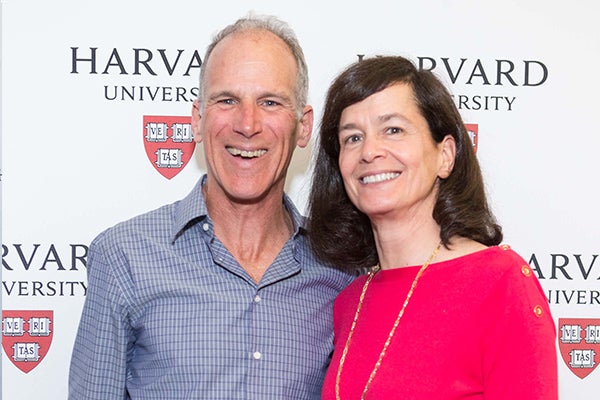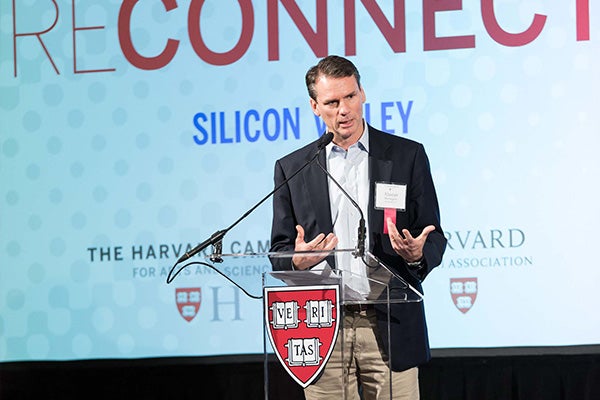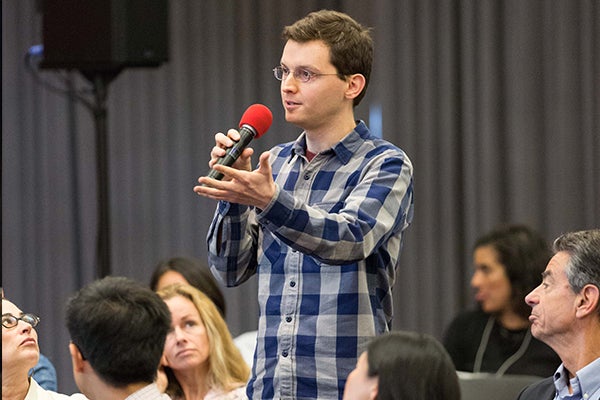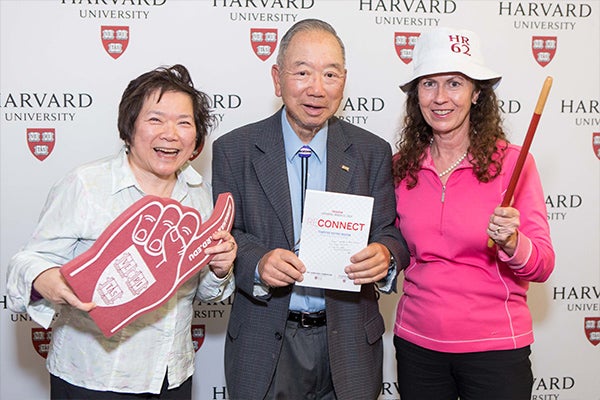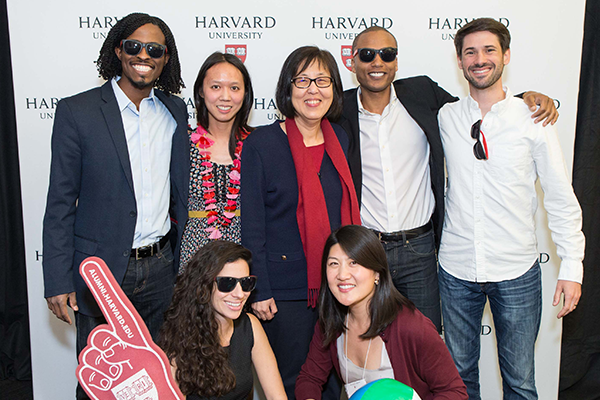What is the impact of a Harvard education? Are we teaching undergraduates how to solve real-world problems? How do we help students take risks and be leaders? More than 300 members of the Harvard community came together to examine these issues at Harvard ReConnect, held at the Computer History Museum in Mountain View, California, on Saturday, March 21.
“We believe that asking hard questions allows us to continue to thrive,” said Harvard College Dean Rakesh Khurana, who helped to lead a day of interactive discussion and debate that examined the value of a liberal arts and sciences education in today’s changing world.
The value of a Harvard education
“Harvard has educated our citizens and citizen leaders over the last four centuries,” said Dean Khurana. How do we sustain this level of excellence in the next century and continue to lead?
Louis “Luke” Menand, Anne T. and Robert M. Bass Professor of English, helped to outline the foundational beliefs for a liberal arts education, hallmarks defined by Harvard: a move from professional training to the pursuit of knowledge for its own sake; the ability to concentrate in one area of academic inquiry; and the concept of a common core requirement to complement that concentration. The role of the liberal arts is to equip students to think critically, said Menand, and to provide them with the tools they need to lead successful and fulfilling lives.
These experiences at Harvard transform a student intellectually, socially, and personally, said Khurana. Additionally, the Houses give Harvard undergraduates the skills they need to develop new ways of understanding themselves and the world around them.
Noting the rising demand for a measurable return on investment in education, Khurana pointed out that the Harvard experience provides the critical assessment skills our future leaders will need to solve real-world problems and meet demographic shifts in national ethnicity, the workplace, and poverty levels.
Citing a study that has found the ZIP code of the hospital where people are born as one of the biggest predictors of health and happiness, he then said, “At Harvard, we’re not going to let the circumstance of your birth determine your potential for success.”
Preparing students to solve real-world problems
How does Harvard teach students to meet the challenges of the 21st century? In a roundtable discussion that included Khurana and Menand, Harvard faculty members shared how they can help students make an impact on the world tomorrow—and today.
David J. Mooney, Robert P. Pinkas Family Professor of Bioengineering, believes that the life sciences will fundamentally change our lives in the next 100 years. The creator of a potential new cancer immunotherapy, Mooney contends that the best way to teach is to give students the task of solving real-world problems. “They need to know how they can make a difference and what the options are,” he said.
Margo Seltzer, Herchel Smith Professor of Computer Science, who studies architecture, databases, and operating systems, shared how Harvard is building an ecosystem of innovation and that she uses interactive classrooms to determine how she divides her time between students who are thriving and those who need more instruction. “When you spend your time with the students who need you the most, then the whole level of the class rises,” she said.
Interdisciplinary collaboration is key to innovation, said John H. Shaw, Harry C. Dudley Professor of Structural and Economic Geology, chair of the Department of Earth and Planetary Sciences, and professor of environmental science and engineering. “Harvard is promoting scholarship across divisional boundaries,” he said. “It’s not about just training technicians, but philosophers and life sciences concentrators together. It’s about educating citizenship.”
An active audience posed questions about online education, what success looks like in higher education, and how to prepare students to address inevitable setbacks in life.
Khurana noted that Harvard faculty are helping students by sharing their own challenges. “When faculty share these experiences, students can drop their own heavy mask of perfectionism and be more authentic,” he said.
Graduates leading in the world
At the close of the day, alumni spoke of the influence that a Harvard education had on their paths as leaders in their fields, sharing advice in a panel moderated by Emily Chang Stull ’02, anchor of Bloomberg TV.
Susan Wojcicki ’90, CEO of YouTube, advocated for the importance of her humanities concentration and CS50, which she took her senior year. Both gave her the foundation, ability, and tenacity to anticipate an emerging market. “You need to be able to apply insights, a glimpse into something that no one else sees,” she said.
Alfred Lin ’94, partner of Sequoia Capital, noted that students need to be risk-takers. “There are 100 assumptions that make an industry happen,” he said. “We need people to challenge maybe five of those assumptions and break a rule because it doesn’t make sense.” The Harvard experience teaches students how to think for themselves, how to be intellectually curious, and how to “hustle,” he said.
Evan Goldberg ’87, founder, chairman of the board, and CTO of NetSuite, said that Harvard fosters entrepreneurism when it helps students to “break glass” and react to problems in a unique way. This different way of evaluating the world is key, he said, pointing to the number of artists on the Netsuite experience design team. “The diversity they bring to their thought and approach is fantastic,” he said.
The Harvard community in the West
This was the fifth annual ReConnect, a gathering of alumni, parents, and friends in the West.
“You are important partners for Harvard,” Mike Kerr ’81, MBA ’85, P’19, ’12, ’08, co-chair of the Harvard College Fund (HCF) Executive Committee, told participants, sharing that donors from the West Coast have given $280 million to The Harvard Campaign for Arts and Sciences. The region’s influence is growing—Harvard is seeing for the first time more incoming students from California than New England. And when they graduate, many will return to their home state. Co-chair of the HCF West Coast Council Ted Samuels II ’77, MBA ’81, P’14, ’13 noted, “California is critical to the success of Harvard and its future.”
